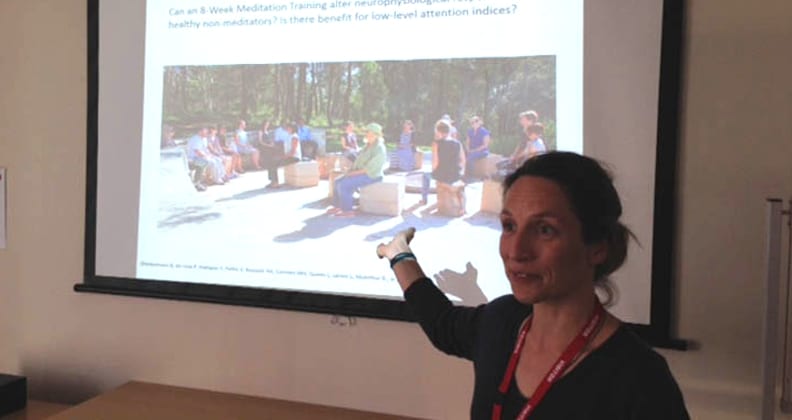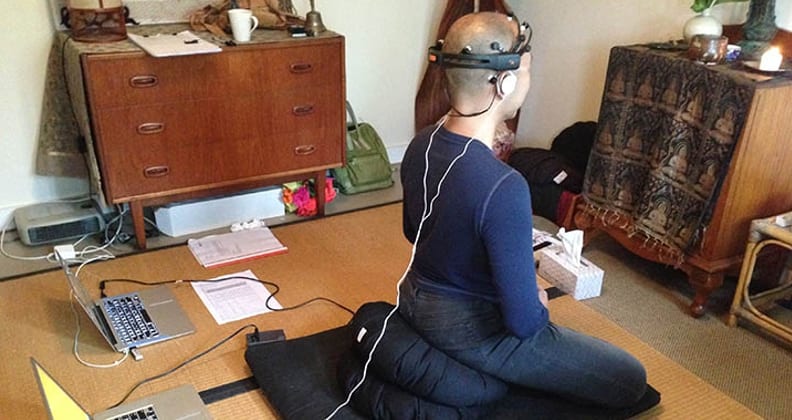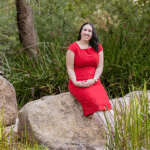Strategy, an adventurous streak and more than a few leaps of faith have been key to the development of Dr Britta Biedermann’s academic career. As a child, she dreamt of attending university, bicycle in tow. A growing interest in psycholinguistics and neuropsychology led to postgraduate studies in aphasiology in Germany and, later, a PhD and two post-docs at Sydney’s Macquarie University.
In 2015, Dr Biedermann moved again, this time to Perth to take up a position at Curtin’s Faculty of Health Sciences. Her main areas of research interest are the cognitive neuropsychology of language, and using meditation as a treatment tool to assist word retrieval.
What sparked your passion for science and when did you decide you wanted to build a career in this area?
Since I was a child, I wanted to go to university. I was not really clear what I wanted to study, but I knew I wanted to be a student in a small university town somewhere in Germany, zipping around on my bicycle.
Pretty quickly I became determined to study psycholinguistics, and later the neuropsychology of language. I eventually moved to Freiburg, a small university town in the south of Germany, as I knew that a well-known researcher, Professor Gerhard Blanken, was teaching about aphasiology there. Aphasiology is the science of language breakdown after stroke.
Under Professor Blanken’s supervision, I wrote my Masters thesis. He recommended, amongst many references, the book Spoken Word Production and Its Breakdown in Aphasia by Professor Lyndsey Nickels. I was fascinated by her clarity of writing, and I secretly set myself a goal: once my thesis was submitted, I would contact her and ask if I could do an internship at her department before commencing my clinical year in a rehabilitation clinic in Germany.
The answer was prompt – ‘What question would I bring, and could I think of a small project description?’ Soon I was on a plane to Sydney for a five-month internship. Five months turned into 12 years, including a PhD and two post-docs at the Department for Cognitive Science at Macquarie University, under the close mentorship of Professor Lyndsey Nickels and Professor Max Coltheart. I was lucky to experience an atmosphere of diversity, inclusion, openness and creativity throughout that 12 year period.
Describe your area/areas of research.
I am trying to find out how our language system works. My research focus is the cognitive neuropsychology of language. When a language system breaks down, for example after a stroke, a unique window into the underlying architecture of our language processes is provided. I am using treatment techniques to inform current theory and, in turn, theory to inform therapy. This is a cycle commonly used in cognitive neuropsychology, not only in the language domain.
I am currently developing two new research streams – firstly, how do speakers, with and without a stroke, access words when they speak more than one language? We are living in an increasingly multilingual world, in fact most people across the world use more than one language, but it is surprising how underspecified theories of bilingual language processing still are, and how little we know about how we can best assist a bilingual client after stroke in his/her language recovery.
Secondly, how can we use meditation as a treatment tool to reduce word retrieval difficulties, which is a research area I brought to Curtin. It might sound very esoteric initially, but studies with healthy participants show beneficial effects on attention processes, so if some of the word retrieval difficulties after stroke are caused by an underlying attention deficit, meditation should also enhance word retrieval since this process depends heavily on attention processes.

If the difficulty is caused by an anxiety to speak, meditation is also expected to reduce word retrieval difficulties (this has also been shown in the healthy literature). However, if word retrieval difficulties are caused by impairments of the word representations themselves, meditation is not expected to have an effect. As you can see, ‘word retrieval difficulties’ can have very different causes, even though they look the same on the surface. We are currently running a meditation study together with Associate Professor Anne Whitworth, and two honours students, at the Curtin Health and Wellness Centre.
How long have you been at Curtin, and where did you work/what did you do prior to joining the University?
I joined the School of Psychology and Speech Pathology in July 2015. Prior to that, I worked in research-only positions at Macquarie University at the Macquarie Centre for Cognitive Science (MACCS), which later hosted the ARC Centre of Cognition and its Disorders (CCD). Prior to that, I studied in Göttingen and Freiburg, Germany.
What have been your biggest challenges in your career, specifically as a woman in STEMM, and how did you overcome them?
I was very lucky to have been offered a permanent position here at Curtin in 2015. To get a permanent position is possibly the biggest challenge in academia, as you are employed most of the time on ‘soft money’ (short term contracts, grant money), especially as an early-career researcher.
Negotiating pay levels is something I am absolutely hopeless at, and I can see that my male colleagues have a very different confidence when doing this – not all of them, but I know more male colleagues who are good at this than I know female colleagues. An equally big challenge for me currently is adapting to a research and teaching position, balancing both demands while trying to have a life outside work. I am trying to overcome both challenges by talking openly about these hurdles with my peers, and also with my older, more experienced, colleagues.
After my first year at Curtin, I went to my line manager(s) and expressed that I was feeling very overwhelmed and that I didn’t really feel I could do the work I enjoy or am really good at, so we looked at ways to change this. This year, my first semester is very teaching-light, so I can focus on my research, whereas I know in the second semester I will have a teaching-heavy semester, but I am not putting myself under pressure to do it all at once. I don’t work well when I need to multi-task all the time, so this divide works much better for me.
Another big challenge when I started at Curtin was the realisation that there was only one full female professor in my department, and the group I am mainly teaching in – Speech Pathology – does not have a single one. My observation has been that there is a cohort of women that is highly qualified, and builds the majority of the department, but that they are not really represented at higher levels.
Observing these circumstances firsthand was one of the motivations for joining the ATHENA SWAN panel in my faculty to perhaps share some of my previous experiences where the female/ male ratio was pretty balanced.
What have been your biggest successes/successes you are most proud of?
I’m not sure if ‘proud’ is really the right word. I am good at creating spaces that feel inclusive, and at facilitating the exchange of ideas. I have co-supervised four PhD students to date – from Germany, India, France and the UK – and have learned so much from their different cultural perspectives. I often attend lab meetings with almost all continents represented around the table. Bringing all these different perspectives together, while talking about a very specific research question, is a really fascinating experience. The experience of working in such a diverse environment shaped my perspective, and this experience is what I ultimately would like to pass on to my future students.
What has assisted you in developing your career?
As I mentioned above, I was fortunate to have wonderful mentors along the way, but if I didn’t have a supportive partner, who has been open and adventurous enough to move with me across the continent, I possibly would have not taken up the position here at Curtin. I am very grateful to him for this.
What makes a successful scientist?
Being curious, open, approachable, humble (being able to state ‘I don’t know’ or ‘I was wrong there’) with a good pinch of assertiveness.
What would you say to young girls and women who are interested in developing careers in STEMM?
Don’t judge a scientist only by their ‘labels’ or ‘titles’. Don’t be shy to ask questions – approach researchers directly who work in the field of your interest. In this way you can already test a very important feature of a good scientist – are they approachable? Ultimately, you want to work with someone who is knowledgeable and is able to guide you in developing your own ideas.
What are the barriers to women participating successfully in STEMM areas, and what can we do to reduce these barriers?
Women need flexibility in our work lives. I am sure every individual benefits from flexibility, but women are the ones who give birth, so no other gender can help us with this. Women are also often the ones who take on primary carer responsibilities. There are also men, of course, but the majority are still women. Especially in academia, we often work overseas for a long period of time, the workplace needs to accommodate for special circumstances when we need to attend to our family/ loved ones. If we get this support, it will increase our wellbeing and our loyalty to our workplace.
I have discussed this many times with my colleagues, so this is not my idea alone: to reduce barriers for women in STEMM, and for everyone really, we need to rewrite promotion criteria and value ‘care taking’ more. If we are also assessed against how much time we spend in showing care for and interest in others, and in supporting others along the way, a collegial, nurturing and supportive environment will be created, and such an atmosphere is so important for everyone’s wellbeing and learning. Impact factors, citation and publication rates and awards have their place, no doubt, but are currently overemphasised.
On reflection, is there anything you would change about your career?
The job market for mid-career academics is incredibly tight. This means you can be tempted to take on more work than you can possibly cope with, just because you know if you don’t do it, there are many people who would love to have your job. So the ‘lucky’ ones who have the jobs are incredibly overworked and time-poor which can result in feeling depressed, and the ones who all have wonderful qualifications but are finding it hard to get a permanent position also feel depressed because they cannot work in their profession. Many therefore leave academia at this career point (the majority being women).
I don’t need to explain more about what I am thinking – it is obvious – can we share the work? It would be beneficial for the wellbeing of all. I know it is quite expensive to make this happen, but time is a problem in this career. Be it to have enough time with your children, or friends, or getting involved with the community, especially when you move to a new city for a new job, you need some time to put roots down, but if you are so time poor, it is difficult to develop a sense of belonging.



